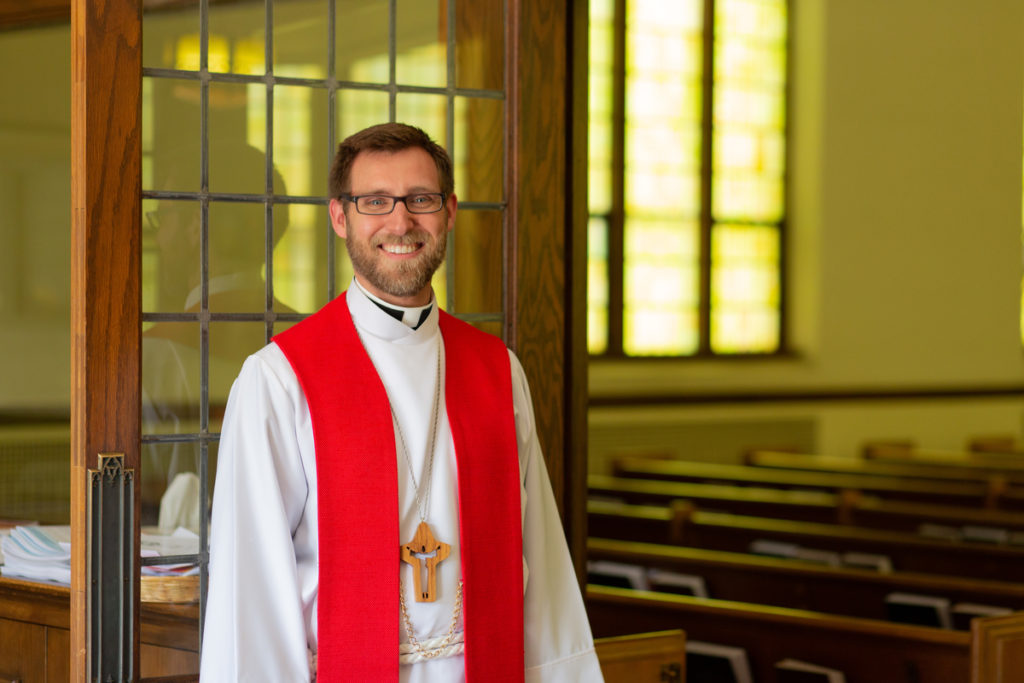A friend of Lutheran CORE has written a side-by-side, phrase-by-phrase comparison of every phrase in the Lord’s Prayer as used by Ebenezer HerChurch with the version of the Lord’s Prayer as translated by the English Language Liturgical Consultation. Here is a PDF link to that comparison, but it is also below in text. Per Lutheran CORE’s Executive Director, Dennis Nelson, “People need to know how bad Ebenezer HerChurch is and that the ELCA allows it.”
The Lord’s Prayer is one of several liturgical texts which have been rewritten for use in worship at HerChurch. How does the revision fare? Here is a side-by-side, phrase-by-phrase comparison of every part of the The Lord’s Prayer as used at HerChurch with every corresponding part of the standard edition of The Lord’s Prayer as translated by the English Language Liturgical Consultation (ELLC), with commentary on the revision.
| HerChurch | Original |
| Our Mother | Our Father |
This part scraps the biblical witness to take up unsanctioned innovation with pagan roots. In the biblical text, nowhere do we find a model of, and nowhere are we given the authority for, calling upon God by the name “Our Mother”. Worship of the “mother”, the “goddess”, the “divine feminine”, is a marked feature of pagan religious tradition. It has no basis in Christianity.
| HerChurch | Original |
| who is within us, | in heaven, |
Gone, in this part, are the ideas of heaven and that we have a higher power above us. We are to look within ourselves, rather than up to the one who is greater than we are. But God is above us, and greater than us. It is this very fact which makes the incarnation of Jesus Christ so radical: that God, the Most High, humbled himself to become like us, to suffer and die for us.
| HerChurch | Original |
| we celebrate your many names; | hallowed be your name; |
This part lacks humility. Rather than ask God to do for us, in this part, we are to tell God what we do. Rather than submit to God’s authority and will, we demand that God must submit to us. Absent is the notion that God’s name is holy, and the implied petition that God’s name be made holy in us. In fact, there is no mention of holiness in the revision.
| HerChurch | Original |
| your wisdom come, | your kingdom come, |
In this part, rather than ask for God’s kingdom—in which all wrongs are made right, all of God’s people belong, and all of creation is made whole—to come amongst us, here we are to ask merely for “wisdom” to be bestowed upon us. A rather myopic and self-centered request.
| HerChurch | Original |
| your will be done, unfolding in the depths within us. | your will be done, on earth as in heaven. |
Gone, again, is the idea of heaven, in this part. And, again, we have a myopic request. Rather than ask for the whole world to be subject to God’s good will, we are to ask only for God’s good will to unfold within ourselves. Quite inconsiderate, myopic, and self-centered.
| HerChurch | Original |
| You give us everything we need. | Give us today our daily bread. |
This part is more of a statement than a petition, an affirmation of sorts. The statement is not wrong, strictly speaking, as God does indeed give us everything we need. But the revision entirely misses a key point of the original petition: that we are told to ask, and free to ask, for our Father in heaven to provide our every need. God invites us to ask, and graciously provides for us.
| HerChurch | Original |
| You remind us of our limits and we let go. | Forgive us our sins as we forgive those who sin against us. |
Gone, in this part, is the notion that we have “sins” for which we need God’s “forgive[ness]”, which is central to Christian faith. It is replaced with the words that we are “remind[ed] of or limits” and that “we let go”. But “sins” are not mere “limits”. “Sins” are trespasses against the Law of God. And we aren’t merely “remind[ed]” of our sins, nor are we to simply “let go” of
them. God calls on us to repent–confess, turn away from our sin, and turn again to God–in order to receive God’s forgiveness. Also gone, in this part, is the notion that we, too, are to forgive.
| HerChurch | Original |
| You support us in our power, | Save us from the time of trial, |
Entirely absent, in this part, is the notion that we are tempted, let alone that we need deliverance from temptation. That is replaced with an affirmation that God, supposedly, “supports us in our power”. But what kind of power? And to what end? The prayer does not say. God does not always “support us in our power”. Scripture has many examples of God rebuking the powerful, and of God taking away power from those who misuse it.
| HerChurch | Original |
| and we act with courage. | and deliver us from evil. |
Entirely absent is the notion that there is “evil” which we need to be delivered from. Instead there is an affirmation that, supposedly, “we act with courage”. But what act do we do with courage? Is it, or is it not, something of which God approves? Again, the prayer does not say.
This prayer is not particularly comforting to one who knows well that he or she does not “act with courage”. The original prayer is a source of strength to the weak ones who pray it in times of trouble. The revision expects that the one who prays is already strong and courageous.
| HerChurch | Original |
| For you are the dwelling place within us, the empowerment around us, the celebration among us, | For the kingdom, the power, and the glory are yours, |
This seems to be an attempt to avoid words that reflect power and hierarchy: “kingdom”, “power”, “glory”. There are some for whom it has become fashionable to replace “kingdom” with “kin-dom” for similar reasons. But the reality is that God is our King, has power over us, and has glory above ours. God is not our equal. God is greater. To strip that away masks the truth that above everyone and everything, above even the most powerful, God is King.
Again, the revised wording is self-centered rather than God-centered, inward-facing rather than Godward-facing. Rather than God’s “kingdom”, God’s “power”, and God’s “glory”, it speaks of our “dwelling place within”, our “empowerment”, our “celebration”.
| HerChurch | Original |
| now and forever. Blessed be. | now and forever. Amen. |
“Blessed Be” is a pagan greeting, as well as a common way to end prayers in neopagan traditions. And herein is revealed the true origin of the Our Mother in Heaven prayer, and more broadly, of the “Divine Feminine” spirituality which HerChurch promotes: paganism.
This “Divine Feminine” is not merely a contextualization of the historic Christian faith for women; it is something entirely different, which borrows heavily from pagan traditions, without truly “baptizing” them. The resulting religion strays quite far from biblical Christianity. It cuts out essential doctrines of the Christian faith, and it adds beliefs which are contrary to the Christian faith. We clearly see it happen in this revision.
This prayer is not the Lord’s Prayer. It is not even a poor imitation of the Lord’s Prayer. It is something different entirely. It bears little resemblance to the original, since it has been so thoroughly rewritten according to the whims of the “Divine Feminine” spirituality followers.
This prayer is not suitable for use in true Christian worship; avoid it entirely. Choose a standard translation of the Lord’s Prayer instead, in order to truly pray the prayer that Jesus taught us.




















2 Thessalonians 2 comes knocking, Dennis. As bad as the ‘man’ of lawlessness is, what’s even more terrifying are those who blindly accept, support or even just dismiss what is happening at their front door.
Amen. Well stated. I completely agree.
Somebody forgot that the lords prayer is a prayer against ourselves. I remember this prayer being handed out at Luther Seminary for worship service. I of course did not pray the prayer, but sat in silence praying against the words being said at the the chapel. It is pure evil.
I also remember the students speaking how empowering the prayer was, and I was, “Of course it was! It was feeding the old Adam!”
Thank you for your faithful commitment to Christ and the historic, orthodox Christian faith.